Picture this: You’ve had a tough day, and all you want to do is vent to someone who cares about you. So, you turn to your partner or a close friend, hoping for a listening ear and some understanding. But here’s the twist – sometimes, this venting can cross the line into what we call “emotional dumping in relationships”.
Emotional dumping isn’t about judging anyone or pointing fingers; it’s about understanding and finding better ways to support each other.
In this article, we will talk about –
- What is emotional dumping
- Emotional dumping in relationships,
- The signs of emotional dumping, and
- The effects of emotional dumping.
Related: Do Your Friends Treat You Like An Emotional Dump Ground? If Yes, This Is For You
What Is Emotional Dumping In Relationships?
Alright, imagine you have come home after a rough day at work or school, feeling like you’ve just been through a tornado of emotions. You’re aching to let it all out, and there’s your partner, sitting on the couch, ready to listen.
So, you spill the beans, unleashing a torrent of pent-up frustrations, fears, and anxieties all at once – that’s emotional dumping in relationships!
In a nutshell, emotional dumping in relationships happens when you offload your emotional baggage onto someone else, often without much consideration for their feelings or capacity to handle it. It’s like dumping a truckload of emotional junk on their doorstep without even a warning.
Now, we’re all human, and it’s natural to seek support from our loved ones. But emotional dumping can turn a well-intentioned venting session into an overwhelming and one-sided emotional overload.
Think of it as those times when your friend calls you just to talk about their problems for hours, leaving you feeling emotionally drained and with little room to share your own experiences.
Emotional dumping in relationships can create a lot of tension and resentment. It might make the other person feel like they’re constantly playing the role of an emotional dumping ground, always receiving but never getting a chance to express themselves. It can lead to communication breakdowns and even strain the strongest bonds.
Now that we know what is emotional dumping in relationships, let’s explore the different signs of emotional dumping or signs that someone is emotionally dumping on you.
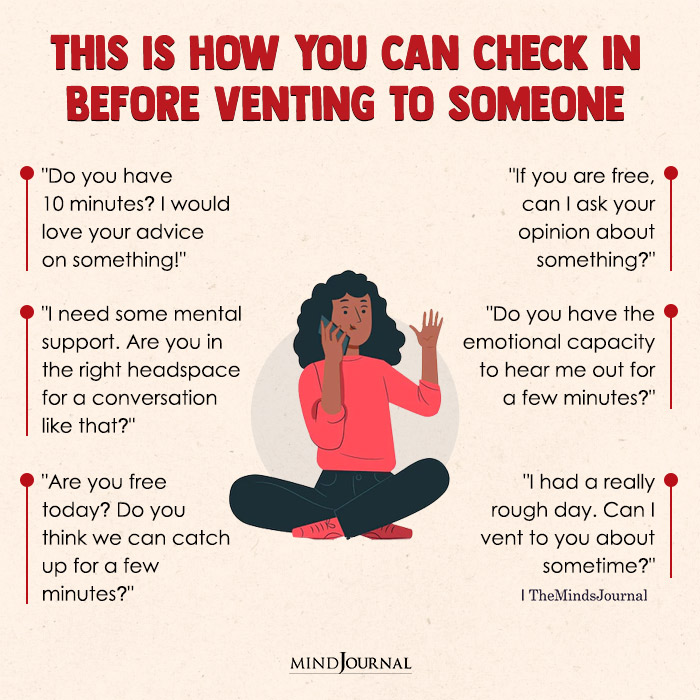
12 Signs Of Emotional Dumping
1. You always feel annoyed, stressed, and tired after talking to them.
What is emotional dumping? This is, right here!
Suppose you’re having a conversation with someone, and suddenly, they unleash an avalanche of emotions onto you. It’s like a tsunami of feelings crashing down, leaving you feeling overwhelmed and exhausted.
The thing is, emotional dumping in relationships lacks balance and consideration for your emotional well-being. It’s like being caught in a storm of emotions, with no shelter to protect yourself. Instead of a two-way street, the conversation becomes a one-sided outpouring of their struggles and complaints.
What’s even more challenging is that it can hit you out of nowhere, leaving you emotionally unprepared. Your heart starts pounding, and your mind goes into overdrive, trying to figure out how to handle this emotional onslaught.
The aftermath is draining. It leaves you feeling like you’ve been through an emotional marathon without even lacing up your sneakers. It can create a sense of frustration and helplessness as if you’re carrying the weight of their problems on your shoulders.
If this happens frequently, it’s like being stuck on an emotional rollercoaster with no way to get off. The constant stress and anxiety can take a toll on your well-being, leaving you feeling on edge whenever you see them approaching.
In these moments, you might yearn for a meaningful, balanced connection – a place where you can both share and support each other’s emotions without feeling overwhelmed.
But for now, you find yourself grappling with the effects of emotional dumping, wondering how to navigate these rough emotional waters.
2. You are always forced to see them as the victim, and never the culprit.
Ah, the victim card – one of the biggest signs of emotional dumping in relationships.
When someone consistently avoids taking responsibility for their issues and resorts to playing the blame game, it can feel frustrating and disheartening. You might find yourself longing for them to face their challenges head-on, seeking solutions and personal growth instead of pointing fingers.
Their refusal to confront reality and their reliance on external factors as the root of their problems can leave you feeling like a helpless bystander, unable to offer the support you wish you could.
It’s like watching a never-ending cycle of evasion, making you yearn for a more balanced and accountable relationship.
Related: The Difference Between Healthy Venting and Toxic Dumping
3. You see them blaming others all the time and never taking responsibility for their actions.
Emotional dumpers are experts when it comes to playing the blame game. It’s like a broken record of finger-pointing, and it can be seriously draining. No matter the situation, they never seem to accept any responsibility for their own struggles.
Instead, they eagerly point fingers at others, making them the perpetual victims in every tale of woe.
Dealing with constant blame-shifting can be frustrating and exhausting. It leaves you feeling like you’re stuck in a loop of excuses, never getting to the heart of the matter. Their refusal to acknowledge their part in their own challenges can make you feel like your efforts to offer support or perspective fall on deaf ears.
And let’s not forget that it’s not just about big life issues; it can be about the little things too. Even the most minor mishap somehow becomes someone else’s fault in their narrative.
It’s like being caught in a vortex of negativity, where you long for them to see that life’s challenges aren’t always solely the fault of others.
You might find yourself craving a more open and self-aware conversation, where both parties can own their actions and feelings without constantly deflecting.
But alas, the blame game continues, and you’re left feeling like a helpless spectator to their emotional dumping parade.
4. You try to give them solutions to their problems, but they are not at all interested in solutions.
If you are wondering what is emotional dumping, then this is it in a nutshell.
When you compare emotional dumping in relationships to genuine emotional sharing, it’s like night and day. The latter involves open communication and a genuine desire to find solutions and make things better.
But emotional dumping? Nah, it’s all about unloading negativity without a care in the world.
Dealing with an emotional dumper can leave you feeling like there’s no room for mindfulness or healthy communication in the relationship. It’s like being stuck in an endless loop of venting and complaining, with no resolution in sight.
Their communication style lacks any consideration for how their words affect you, leaving you feeling like a dumping ground for their emotional baggage.
And here’s the kicker – they don’t even want a solution! All they crave is an outlet to spew their toxicity without any regard for how it impacts you or the relationship. It’s like they’re not interested in finding common ground or proactively addressing their issues; they just want a captive audience for their emotional venting.
It can leave you feeling drained and frustrated, wishing for a more balanced and respectful form of communication. You might long for a connection where both parties can genuinely share and support each other, without the constant barrage of emotional dumping.
5. You are made to feel like their therapist and personal sounding board, all the time.
This is one of the major signs of emotional dumping.
Being there for a friend in tough times is expected, but emotional dumpers make you feel like an unpaid therapist. Every conversation revolves around their problems, leaving you emotionally exhausted and craving reciprocity.
The lack of emotional support in return makes you feel like you’re constantly giving, but never receiving. When you gently suggest seeking professional help, they get offended and accuse you of not wanting to help, adding another layer of frustration to the mix.
It’s like you’re stuck in a never-ending cycle of being their emotional sounding board, without any relief or support when you need it most. The imbalance in the relationship leaves you feeling drained and wondering if there’s a way to find a healthier, more equal footing.
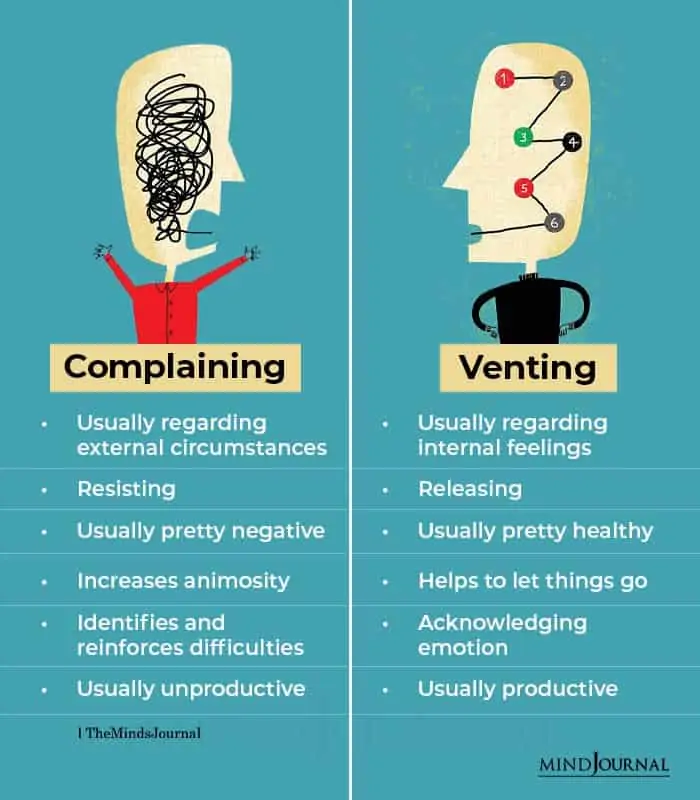
6. You are never asked whether you want to listen to them or not; your feelings and emotional state are never given any respect or priority.
Another one of the major signs of emotional dumping is that emotional dumpers never bother to ask if it’s okay to talk; they simply ambush you without warning. They seem oblivious to whether you have the emotional energy to support them or if you’re dealing with your own issues.
It’s like they expect you to drop everything and be there for them at a moment’s notice, regardless of your own emotional state. This lack of consideration makes you feel like your feelings and boundaries don’t matter, leaving you frustrated and overwhelmed by their demands for attention.
You yearn for a more respectful approach, where both parties can be mindful of each other’s emotional well-being and seek consent before unloading their problems.
Related: 14 Things Only People Who Suppress Their Feelings Will Understand
7. You always have to listen to all sorts of negative, bitter, and angry things which takes a toll on you after a point.
Emotional dumping in relationships is often accompanied by a cloud of bitterness. You can’t help but notice that the person seems unable to see anything positive in anyone or anything.
It’s like the world is an unfriendly place, and they’re convinced it’s out to get them. Their bitterness spills out loudly, and it’s hard to escape the toxic atmosphere it creates.
Witnessing this bitterness can take a toll on you and the relationship, and is one of the worst effects of emotional dumping. It eats away at the joy and positivity, leaving you feeling drained by the constant negativity.
The emotional dumping becomes a way for them to unload their bitterness onto others, and it feels like you’re caught in the crossfire.
In these moments, you might find yourself yearning for a more balanced and uplifting connection, where positivity and understanding can thrive. But for now, it’s like being stuck in a room filled with bitterness, desperately searching for an escape route.
8. You feel exhausted listening to the same thing over and over again.
When you are dealing with emotional dumping in relationships, it can feel like being trapped in a Groundhog Day of emotions. Instead of seeking resolution, they continuously revisit the same problems and complaints, as if they’re stuck in an unending loop.
It’s like they’re replaying their struggles on a broken record, with no progress or action to improve their situation.
This repetitive cycle can be emotionally draining and frustrating. You might feel like your efforts to offer support and understanding go unnoticed, as they seem more interested in reliving their pain than finding ways to move forward. It leaves you feeling helpless, unable to break through the cycle and offer the help they truly need.
The lack of progress and the constant rehashing of their problems can strain the relationship, making you yearn for a more constructive and forward-moving connection. You find yourself longing for a chance to help them find a way out of the loop, but for now, it’s like watching them endlessly circle around their pain without finding an exit.
9. You feel underappreciated, used, and like an option, whenever you interact with them.
One of the biggest signs of emotional dumping is when you feel used and like an option, and nothing more.
Emotional dumping leaves you feeling utterly drained as if you’re running on an empty emotional tank. Despite investing time and energy to understand their problems and offer support, it seems like your efforts go unnoticed and unappreciated.
There’s a sense of being taken for granted, as they continuously rely on you without acknowledging the toll it takes on you.
The lack of gratitude and recognition makes you feel used, like an emotional punching bag they turn to whenever they need to unload. It’s like your own emotions and well-being are secondary, with little regard for how their constant dumping affects you.
As time goes on, bitterness and resentment creep in, wondering why you bother to be there for them when it feels like a one-way street. You yearn for a connection where your efforts are valued, where you can both give and receive support without feeling drained and unappreciated.
10. You feel annoyed because they always talk about themselves and are always concerned about their own problems.
What is emotional dumping? This is what it looks like.
Having a conversation with an emotional dumper feels like you’re stuck in a monologue marathon. It’s always about them and their problems, leaving no space for your thoughts or feelings.
You can’t help but notice the lack of interest in what’s happening in your world, and it makes you feel unseen and unimportant. The constant focus on their own issues can be emotionally exhausting, leaving you yearning for a more balanced and reciprocal exchange.
It’s like they have blinders on, unable to see beyond their own struggles, and it leaves you feeling like your voice doesn’t matter in the conversation.
Related: 44 Empathy Statements That Will Make You The Greatest Listener
11. Your time and privacy is never respected.
They show little regard for your time and commitments. They expect you to be at their beck and call, regardless of what you have going on in your life. There’s no consideration for the fact that you might have other responsibilities or priorities, and this is one of the worst signs of emotional dumping.
The lack of opportunity to pause the conversation and resume it later makes you feel trapped and overwhelmed. It’s like they don’t recognize that your time is valuable too, and they expect you to drop everything for them without question.
Their relentless demand for your undivided attention makes you feel like your own needs and boundaries don’t matter. It’s as if their problems are the only ones that count, leaving you feeling stretched thin and emotionally drained.
In these moments, you might wish for a more balanced approach, where both of you can support each other while respecting each other’s time and space. But for now, it’s like being held hostage by their emotional demands, yearning for a chance to find some breathing room.
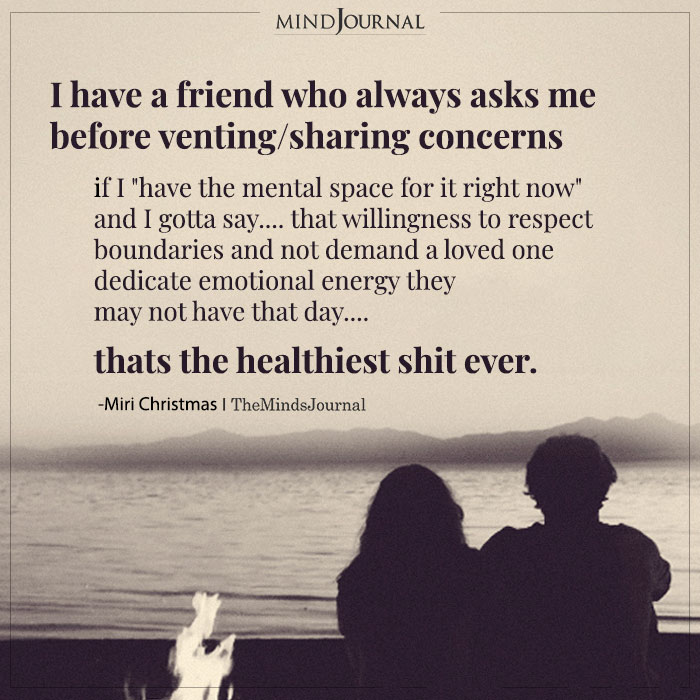
12. You are always made to listen to the same old problems of the past and the constant “traumatic experiences” they go through.
They have a habit of constantly revisiting past problems and traumas to elicit sympathy. It feels like they use these past issues as a way to draw more attention to themselves and avoid taking responsibility for their present circumstances.
The never-ending cycle of referencing past trauma can be emotionally draining and frustrating. It’s like they’re stuck in a loop of seeking validation and understanding without making any progress toward resolving their current issues.
This constant rehashing of the past leaves you feeling like there’s no room for growth or moving forward in the relationship.
You might long for a more constructive and forward-looking connection, where both of you can address present challenges without getting bogged down by past wounds. But for now, it’s like you’re stuck in the shadow of their history, unable to find a path toward a healthier dynamic.
What Are The Effects Of Emotional Dumping?
Alright, let’s dive into the tumultuous world of emotional dumping in relationships! Buckle up, because we’re about to explore the various effects that this emotional whirlwind can have on our connections.
1. Emotional exhaustion
One of the most immediate effects of emotional dumping is emotional exhaustion. When someone constantly unloads their feelings on you without considering your own emotional capacity, it leaves you feeling drained and overwhelmed.
It’s like they’re siphoning all your energy, leaving you with little left for yourself or other aspects of your life.
2. Feeling used and unappreciated
Emotional dumping in relationships can make you feel like a disposable emotional dumpster. Despite your efforts to be there for them, they never acknowledge your support or show any appreciation.
This sense of being taken for granted can breed feelings of resentment and bitterness.
3. Communication breakdown
The constant focus on one person’s emotions can create a communication imbalance in the relationship. It becomes a one-sided conversation, leaving little room for you to share your own thoughts and feelings.
Over time, this can lead to a breakdown in communication, making it difficult to connect and understand each other.
4. Strained empathy
Emotional dumping in relationships can strain your empathy reserves. When you consistently offer support and understanding without receiving the same in return, it can diminish your ability to empathize fully.
This can lead to a lot of emotional distance between you both.
5. Resentment and frustration
As emotional dumping becomes a pattern, feelings of resentment and frustration can build up. You might feel like you’re trapped in a cycle of negativity and emotional overload without any relief in sight.
Undoubtedly, this is one of the major and worst effects of emotional dumping.
Related: 3 Effective Tips To Vent Without Increasing Your Stress Levels
6. Loss of intimacy
Emotional dumping can erode intimacy in a relationship. When one person consistently uses the other as a sounding board without considering their emotional needs, it creates a sense of emotional distance and disconnect.
7. Avoidance of vulnerability
If emotional dumping becomes the norm, it can discourage open and vulnerable communication and is without a doubt one of the worst effects of emotional dumping.
You might feel hesitant to share your own feelings or struggles, fearing that they will be overshadowed by the constant ranting and venting.
8. Impact on mental health
Continuous exposure to negative emotions and unresolved problems can take a toll on your mental health. It can increase stress and anxiety levels, affecting your overall well-being.
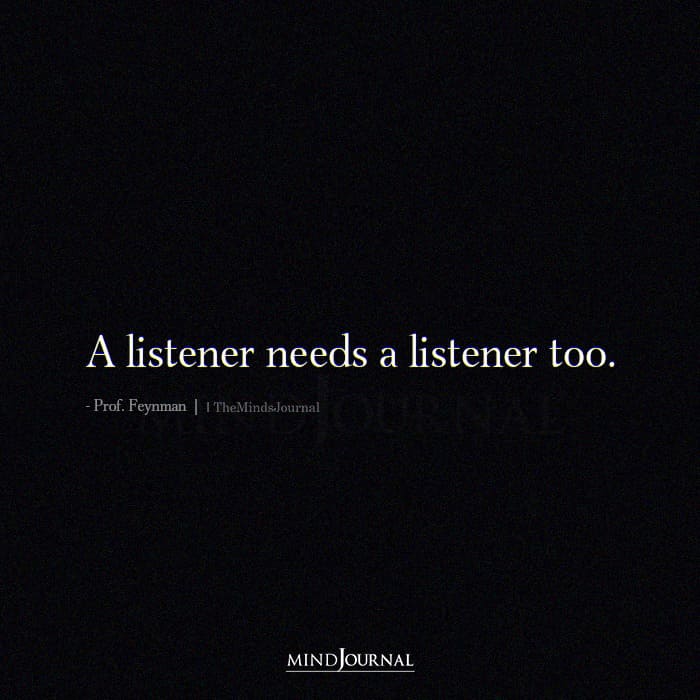
9. Disinterest in connection
Over time, emotional dumping in relationships can lead to a disinterest in connecting with the other person. You might find yourself avoiding conversations or interactions with them to protect your own emotional well-being.
10. Lack of trust
Emotional dumping in relationships can chip away at trust in the relationship. When one person consistently disregards the other’s emotional boundaries and needs, it creates a sense of mistrust and insecurity.
11. Negative communication patterns
One of the major effects of emotional dumping is negative communication patterns.
Instead of engaging in healthy and constructive conversations, it becomes a cycle of venting and complaining, hindering the growth of your relationship.
12. Impact on self-esteem
Constantly being on the receiving end of emotional dumping can impact your self-esteem.
You might wonder why you’re unable to provide the help or support they need, leading to feelings of inadequacy.
Related: Why Broken Men Expect Women To Manage Their Emotions For Them
13. Limited problem-solving
Emotional dumping in relationships tends to focus on venting emotions rather than finding solutions. This can lead to a lack of problem-solving in the relationship, making it difficult to address and resolve issues effectively.
14. Sense of isolation
One of the worst effects of emotional dumping is emotional isolation. You might feel like your partner sees you as a dumping ground, rather than a genuine source of emotional connection and support.
15. Lack of mutual support
In a healthy relationship, there should be a mutual exchange of support and understanding. Emotional dumping disrupts this balance, leaving you feeling unsupported and unheard.
Takeaway
Emotional dumping in relationships is like being stuck in an emotional storm, with feelings flying all over the place. Picture this: you’re trying to enjoy a nice chat with your partner, but suddenly, BOOM – they unleash a torrent of emotions like a waterfall you can’t escape.
And the effects of emotional dumping can be really wild. You feel like you’ve run a marathon, but your running shoes were left at home. Their constant venting and emotional baggage makes you question if you’re their partner or a personal therapist on-call 24/7.
The worst part is that emotional dumping doesn’t know how to take a hint. You try to pause the emotional flood for a quick breather, but they’re like, “Nah, I’m a drama train, and I don’t stop for anyone!”
However, by setting boundaries and speaking up, you can navigate this emotional rollercoaster. It’s time for a bit of emotional spring cleaning – out with the dumping and in with the balanced sharing.
Remember, relationships are a two-way street. It’s not just about them venting their feelings; it’s about a heartfelt exchange where both of you can share and support each other.
Related: How To Set Boundaries To Protect Your Mental Health
So let’s toss out the emotional baggage and make way for a connection that’s light, fun, and rewarding. Together, you can find the sweet spot where understanding and laughter can create a love story for the ages.
So, have you ever been on the other side of emotional dumping in relationships? Let us know your thoughts in the comments down below!
Frequently Asked Questions (FAQs)
Is emotional dumping healthy?
No, emotional dumping is generally not healthy as it can lead to emotional overwhelm and strain on relationships. It’s important to find appropriate ways to express emotions and seek support when needed.
What is toxic venting?
Toxic venting refers to expressing negative emotions in a harmful or excessively repetitive manner, often without seeking solutions or considering the impact on others, leading to increased negativity and emotional exhaustion.
Is trauma dumping a red flag?
Yes, trauma dumping can be a red flag in relationships, as it may indicate a lack of emotional boundaries and the potential for one-sided dynamics that can be overwhelming and unhealthy for both parties involved.
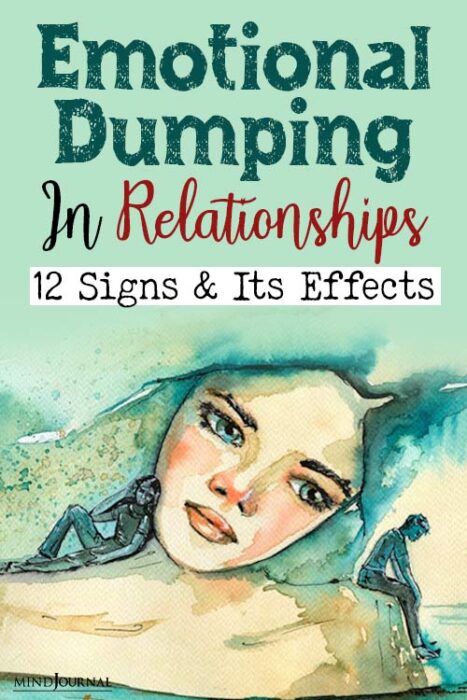
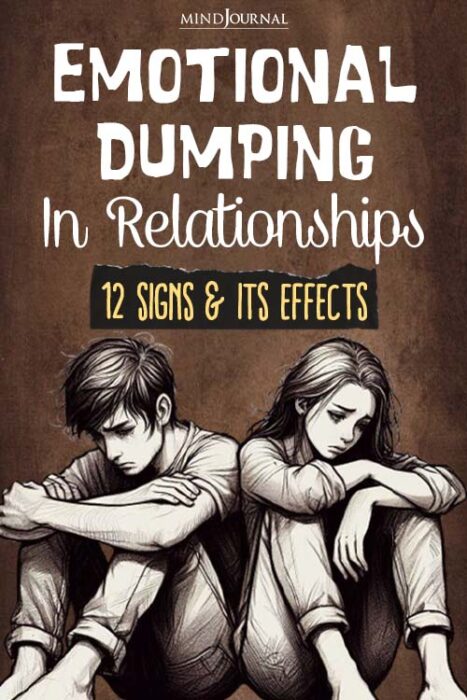
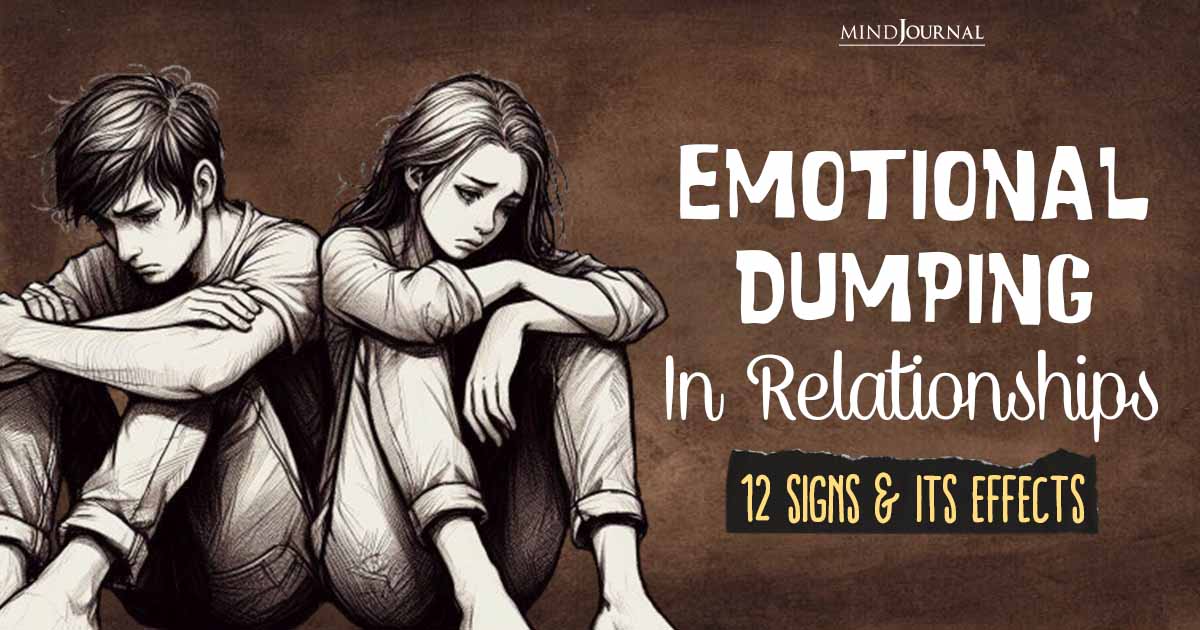







Leave a Reply
You must be logged in to post a comment.